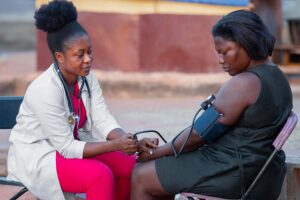Blood donation is more than just a noble act; it’s a life-saving gesture that empowers both the giver and the recipient. In Nigeria, where healthcare challenges often leave many without access to vital blood supplies, donating blood can make a remarkable difference. The physical and emotional benefits of giving blood are undeniable, and understanding why it feels so good can encourage more people to take part in this act of kindness.
The Life-Changing Impact of Blood Donation
When you donate blood, you’re giving someone a second chance at life. Whether it’s a mother in need of a transfusion after childbirth, a child undergoing cancer treatment, or an accident victim in critical condition, your blood could be the one thing they need to survive. The simple act of blood donation can mean the difference between life and death.
But there’s more to the story. Donating blood isn’t just about helping others; it also brings physical and emotional benefits that can make you feel incredible. By giving blood, you’re actively participating in the well-being of your community, and that sense of contribution fills you with pride.
The Physiological Benefits: Feel the Difference
Did you know that giving blood can actually help improve your own health? Here’s how:
- Improved Circulation: When you donate, your body works to replenish the blood you’ve lost. This process boosts circulation, improving heart health and making your body more efficient at delivering oxygen to tissues and organs.
- Reduced Iron Levels: Excess iron in the body can lead to conditions such as hemochromatosis. Giving blood helps to regulate iron levels, reducing the risk of this condition.
- Increased Production of New Blood Cells: After donating blood, your body starts to produce fresh red blood cells, enhancing your overall blood health.
- Psychological Upliftment: The emotional rewards of giving blood are powerful. Knowing that you’ve helped save a life gives you a profound sense of fulfillment. It’s an act that allows you to feel connected to humanity in a meaningful way.
Understanding Blood Donation in Nigeria
In Nigeria, the demand for blood is high, and the number of voluntary blood donors is still limited. According to the World Health Organization, many countries, including Nigeria, struggle with blood shortages due to various challenges in healthcare infrastructure. By choosing to give blood, you’re helping close this gap.
Oneus, a leading organization in Nigeria, understands the complexities of blood donation. Their blood donation website provides essential resources for those interested in contributing, ensuring that the process is as simple and safe as possible. Oneus is dedicated to making blood donation accessible to everyone in Nigeria, offering guidance on where to donate and educating the public about the importance of blood donation.
The Types of Blood Donations You Can Make
Blood donation is not just a one-size-fits-all process. Depending on your blood group and health status, you can choose from several types of donations:
- Whole Blood Donation: The most common form of donation, where a full unit of blood is collected.
- Plasma Donation: Plasma, the yellowish liquid part of blood, is crucial for clotting and treating burns, trauma, and clotting disorders. Donating plasma can be life-saving, and in some cases, it can even be sold at plasma donation centers.
- Platelet Donation: Platelets are essential for blood clotting. Donating platelets can be critical for patients undergoing chemotherapy or those with blood clotting disorders.
- Bone Marrow and Stem Cell Donation: Stem cell and bone marrow donations are critical for patients suffering from leukemia or other blood disorders.
- Cord Blood Donation: Umbilical cord blood banking can provide stem cells that are used in the treatment of various diseases. Private cord blood banking ensures that your newborn’s umbilical cord blood is safely stored for potential future medical use.
Why Blood Donation Is So Important
Every drop counts. In emergencies, the need for blood and plasma is immediate, and shortages can result in lives being lost. For many patients, a blood transfusion is necessary to survive critical health situations, such as surgery, trauma, or certain chronic conditions like anemia.
Without sufficient blood supply, hospitals and health facilities cannot carry out essential treatments. This is why it’s crucial to donate regularly. If you’re considering donating, understanding your blood group, rhesus factor, and genotype can help ensure that you’re donating the right type of blood for those in need.
The Risks of Not Donating
Failing to donate blood when you can might not seem like a big issue, but the reality is stark: lives are lost every day because the required blood is unavailable. Not donating blood during an emergency crisis means fewer lives saved. It’s as simple as that.
How You Can Help: Take Action Now
If you’re ready to become a hero, there’s no time like the present to donate blood. Oneus offers practical tips for getting involved in blood donation, with donation centers across Nigeria ready to receive your generous gift.
To make a real difference, visit the Oneus website for more information on where to donate. Whether it’s donating blood, plasma, or even becoming a stem cell or bone marrow donor, you’ll be playing a critical role in saving lives.
Give Blood, Save a Life – Book Your Donation Now!
Be part of something greater. Your blood can save lives. Contact Oneus today to find out where you can donate blood, plasma, or even cord blood.
Book your donation now at Oneus or call +234 902 168 2822 or email us at info@oneusng.com for more details.
Let’s come together, donate blood, and change lives across Nigeria!




